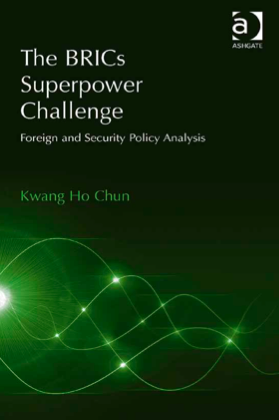
The BRICs Superpower Challenge: Foreign and Security Policy Analysis by Kwang Ho Chun. Ashgate, 2013. 231 pages, $113.95 (www.amazon.com)
In the vast literature on emerging powers and the future of global order, the BRICS grouping plays virtually no role. While the term is mentioned occasionally during debates, there is not a single major book that exclusively focuses on the BRICS countries’ summits and attempts to institutionalize. The majority of scholars is not convinced that the grouping has any tangible political significance yet. That may change if the BRICS Development Bank – which is expected to be inaugurated next month – is sufficiently large to rival existing institutions such as the World Bank. Yet focusing on the emerging powers’ bank alone would imply overlooking notable attempts to cooperate and coordinate policies since 2009, when the four leaders met for the first time in a stand-alone summit.
Considering the dearth of publications on the topic, Kwang Ho Chun’s attempt to fill the gap is laudable – even though the book’s prohibitively high price will reduce his readership to a minimum. In the BRICS countries in particular, where universities lack the funds to acquire expensive books, virtually no-one will have access to his analysis.
The BRICS Superpower Challenge seeks to answer a simple question: Do the BRICS countries have, individually or as a bloc, the capacity to project global influence? Yet rather than focusing on intra-BRICS cooperation, the majority of his analysis assesses Brazil, Russia, India and China individually.
Unfortunately, the book suffers from important shortcomings that drastically reduce its usefulness. In his initial overall assessment of the BRICS, Chun uses data from 2005, which is particularly severe as the topic at hand is in flux. Most sources are strangely dated and obscure, as if the author had finished the manuscript half a decade ago before sending it to the publisher.
Chu dedicates considerable space to a semantic debate about the differences between superpower, hyperpower and great power. This debate takes place within a relatively small circle of academics, and most readers will be well advised to skip to the short summary at the end of the chapter.
The assessments of the individual BRICs countries are woefully out of date – the author says Brazil has “around 160 million inhabitants”, a figure it surpassed decades ago (it currently stands at almost 200 million). In the chapter on Russia, Chun enigmatically argues that “Russia has the capacity to achieve all the aims it has set itself,” adding that “this may take far longer than anticipated.” A later section on security is riddled with factual errors, for example arguing that all BRICs countries condemned the UNSC resolution authorizing the intervention in Libya.
The book reaches an almost comical frequency of absurd mistakes when Chun confuses Iran and Iraq, writing that Brazil “registered a landmark success when it convinced Iraq to enter into a treaty committing it to abandon its nuclear weapons programme” – this will certainly remind younger readers of a conversation between James Baker and Ali G, a British comedian, the latter of whom wonders whether Iran should not change its name to avoid being confused with Iraq.
The BRICS grouping remains little understood in international affairs – yet this book does little to change that.
Read also:
Book review: “The Great Convergence” by Kishore Mahbubani
Book review: “The End of American World Order” by Amitav Acharya
Book review: “Why the Rise of the Rest Is Good for the West” by Charles Kenny








